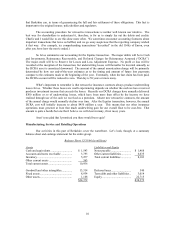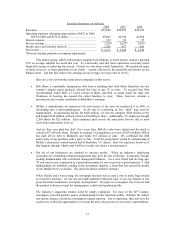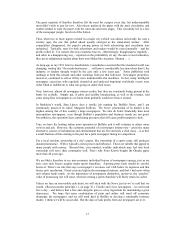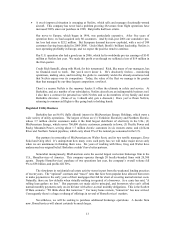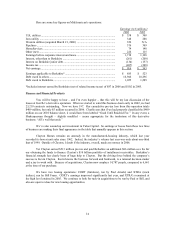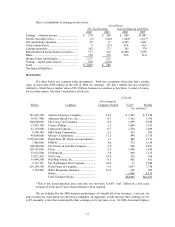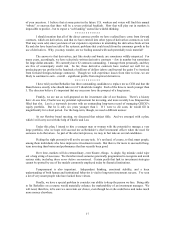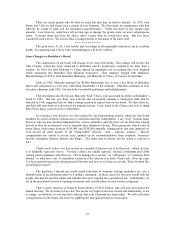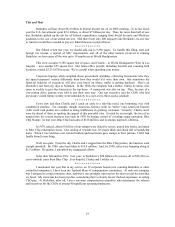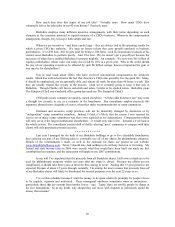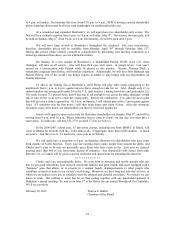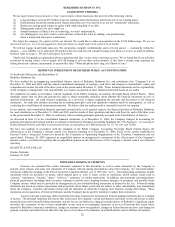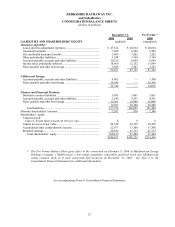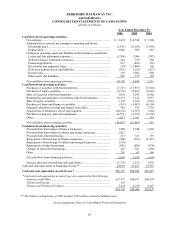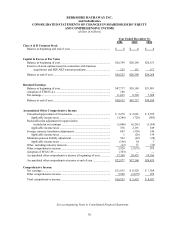Berkshire Hathaway 2006 Annual Report Download - page 21
Download and view the complete annual report
Please find page 21 of the 2006 Berkshire Hathaway annual report below. You can navigate through the pages in the report by either clicking on the pages listed below, or by using the keyword search tool below to find specific information within the annual report.
How much time does this aspect of my job take? Virtually none. How many CEOs have
voluntarily left us for other jobs in our 42-year history? Precisely none.
Berkshire employs many different incentive arrangements, with their terms depending on such
elements as the economic potential or capital intensity of a CEO’ s business. Whatever the compensation
arrangement, though, I try to keep it both simple and fair.
When we use incentives – and these can be large – they are always tied to the operating results for
which a given CEO has authority. We issue no lottery tickets that carry payoffs unrelated to business
performance. If a CEO bats .300, he gets paid for being a .300 hitter, even if circumstances outside of his
control cause Berkshire to perform poorly. And if he bats .150, he doesn’ t get a payoff just because the
successes of others have enabled Berkshire to prosper mightily. An example: We now own $61 billion of
equities at Berkshire, whose value can easily rise or fall by 10% in a given year. Why in the world should
the pay of our operating executives be affected by such $6 billion swings, however important the gain or
loss may be for shareholders?
You’ ve read loads about CEOs who have received astronomical compensation for mediocre
results. Much less well-advertised is the fact that America’ s CEOs also generally live the good life. Many,
it should be emphasized, are exceptionally able, and almost all work far more than 40 hours a week. But
they are usually treated like royalty in the process. (And we’ re certainly going to keep it that way at
Berkshire. Though Charlie still favors sackcloth and ashes, I prefer to be spoiled rotten. Berkshire owns
The Pampered Chef; our wonderful office group has made me The Pampered Chief.)
CEO perks at one company are quickly copied elsewhere. “All the other kids have one” may seem
a thought too juvenile to use as a rationale in the boardroom. But consultants employ precisely this
argument, phrased more elegantly of course, when they make recommendations to comp committees.
Irrational and excessive comp practices will not be materially changed by disclosure or by
“independent” comp committee members. Indeed, I think it’ s likely that the reason I was rejected for
service on so many comp committees was that I was regarded as too independent. Compensation reform
will only occur if the largest institutional shareholders – it would only take a few – demand a fresh look at
the whole system. The consultants’ present drill of deftly selecting “peer” companies to compare with their
clients will only perpetuate present excesses.
* * * * * * * * * * * *
Last year I arranged for the bulk of my Berkshire holdings to go to five charitable foundations,
thus carrying out part of my lifelong plan to eventually use all of my shares for philanthropic purposes.
Details of the commitments I made, as well as the rationale for them, are posted on our website,
www.berkshirehathaway.com. Taxes, I should note, had nothing to do with my decision or its timing. My
federal and state income taxes in 2006 were exactly what they would have been had I not made my first
contributions last summer, and the same point will apply to my 2007 contributions.
In my will I’ ve stipulated that the proceeds from all Berkshire shares I still own at death are to be
used for philanthropic purposes within ten years after my estate is closed. Because my affairs are not
complicated, it should take three years at most for this closing to occur. Adding this 13-year period to my
expected lifespan of about 12 years (though, naturally, I’ m aiming for more) means that proceeds from all
of my Berkshire shares will likely be distributed for societal purposes over the next 25 years or so.
I’ ve set this schedule because I want the money to be spent relatively promptly by people I know
to be capable, vigorous and motivated. These managerial attributes sometimes wane as institutions –
particularly those that are exempt from market forces – age. Today, there are terrific people in charge at
the five foundations. So at my death, why should they not move with dispatch to judiciously spend the
money that remains?
20


